 Dr Antony Dodd, Senior Lecturer in the School of Biological Sciences and senior author of the paper, said: "This proof of concept research suggests that, in future, we might be able to refine the use of some chemicals that are used in agriculture by taking advantage of the biological clock in plants.
Dr Antony Dodd, Senior Lecturer in the School of Biological Sciences and senior author of the paper, said: "This proof of concept research suggests that, in future, we might be able to refine the use of some chemicals that are used in agriculture by taking advantage of the biological clock in plants. Foodfarmnewstv
SPONSORED

Nigerian Institute of Soil Science- NISS
Translate Food Farm News to Hausa, Igbo, Yoruba and over 100 Languages
Total Pageviews
Search This Blog
Labels
- News (583)
- Images speak (44)
- Press Release (40)
- FACAN (31)
- livestock (31)
- Editorial (30)
- GM (24)
- Seed (21)
- Biotechnology (19)
- wheat (17)
- Cassava (16)
- Research (16)
- AFAN (14)
- Special Report (14)
- Global news (12)
- Rice (11)
- Image Speaks (10)
- Maize (10)
- Soil (9)
- Cocoa (8)
- Disease (8)
- Fertilizer (8)
- Yam (8)
- Bt cowpea (7)
- Coconut (7)
- Ginger (7)
- NCARD (7)
- Cashew (6)
- Potato (6)
- World Soil Day (6)
- new (6)
- Animals (5)
- Apple (5)
- Climate change (5)
- Oil Palm (5)
- Organic agric (5)
- Tomatoe (5)
- Fish (4)
- National Council meeting on Agriculture. (4)
- Shea butter (4)
- World Food Day (4)
- bt cotton (4)
- Interview (3)
- Plant & genes (3)
- Plant genes (3)
- Project (3)
- Sesame (3)
- Tomato (3)
- AI Research on Agriculture (2)
- Achia (2)
- African Cherry (2)
- Communique (2)
- Cotton (2)
- Extension services (2)
- Gene editing (2)
- HAPPY NEW YEAR (2)
- Horticulture (2)
- Insurance (2)
- Kenaf (2)
- Opinion (2)
- Sorghum (2)
- Soybean (2)
- Sunflower (2)
- Turmeric (2)
- seasons greetings (2)
- water (2)
- Artemesia (1)
- Biodiversity (1)
- Birds (1)
- Carrot (1)
- Discovery (1)
- Donkey (1)
- Facts sheets (1)
- Flash Flood (1)
- GES (1)
- GMO Rice (1)
- Garlic (1)
- Genetic (1)
- Groundnut (1)
- Jute bag (1)
- Locust bean (1)
- MERRY XMAS (1)
- Machinery (1)
- Mango (1)
- Milk (1)
- Okra (1)
- Post-harvest losses/ Food Waste (1)
- Presentation (1)
- Seaweed (1)
- Senate (1)
- Tumeria (1)
- Walnut (1)
- flood (1)
- fruits (1)
- millet (1)
Federation of Agricultural Commodity Associations of Nigeria

FACAN
Monday, 30 September 2019
Could biological clocks in plants set the time for crop spraying?
 Dr Antony Dodd, Senior Lecturer in the School of Biological Sciences and senior author of the paper, said: "This proof of concept research suggests that, in future, we might be able to refine the use of some chemicals that are used in agriculture by taking advantage of the biological clock in plants.
Dr Antony Dodd, Senior Lecturer in the School of Biological Sciences and senior author of the paper, said: "This proof of concept research suggests that, in future, we might be able to refine the use of some chemicals that are used in agriculture by taking advantage of the biological clock in plants. Sunday, 29 September 2019
Diet change needed to save vast areas of tropics

If the global demand for animal products continues to grow, large swathes of natural land will vanish potentially leading to widespread loss of species and their habitats.
Saturday, 28 September 2019
Scent brings all the songbirds to the yard
 Chickadees can smell! That is the news from a study out of Lehigh University, the first to document naturally hybridizing songbirds' preference for the scent of their own species.
Chickadees can smell! That is the news from a study out of Lehigh University, the first to document naturally hybridizing songbirds' preference for the scent of their own species.Friday, 27 September 2019
Flavonoid-rich diet protects against cancer and heart disease, study finds
 Consuming flavonoid-rich items such as apples and tea protects against cancer and heart disease, particularly for smokers and heavy drinkers, according to new research from Edith Cowan University (ECU).
Consuming flavonoid-rich items such as apples and tea protects against cancer and heart disease, particularly for smokers and heavy drinkers, according to new research from Edith Cowan University (ECU).Thursday, 26 September 2019
Novel strategy uncovers potential to control widespread soilborne pathogens
 Soilborne pathogens are a major issue worldwide as they can infect a broad range of agricultural plants, resulting in serious crop losses devastating to farmers.
Soilborne pathogens are a major issue worldwide as they can infect a broad range of agricultural plants, resulting in serious crop losses devastating to farmers. Wednesday, 25 September 2019
Road verges provide refuge for pollinators
 With many pollinator species in decline, the University of Exeter study shows verges can provide food and a home for pollinators such as bees, butterflies and hoverflies.
With many pollinator species in decline, the University of Exeter study shows verges can provide food and a home for pollinators such as bees, butterflies and hoverflies.Make varieties available for multiplication within one year, committee advises breeders

The National Committee on Improved Varieties Release on
Crops and Livestock has insisted that breeders must make their registered
candidates available as foundational seeds for multiplication within one year
after registration. This was the agreement reached at a meeting held recently
in National Centre for Genetic Resource and Biotechnology (NACGRAB), Ibadan.
Tuesday, 24 September 2019
Missing link in algal photosynthesis found, offers opportunity to improve crop yields
 Photosynthesis is the natural process plants and algae utilize to capture sunlight and fix carbon dioxide into energy-rich sugars that fuel growth, development, and in the case of crops, yield.
Photosynthesis is the natural process plants and algae utilize to capture sunlight and fix carbon dioxide into energy-rich sugars that fuel growth, development, and in the case of crops, yield. Monday, 23 September 2019
Seaweed farming as a versatile tool in effort to mitigate climate change
 According to the Intergovernmental Panel on Climate Change (IPCC), addressing carbon emissions from our food sector is absolutely essential to combating climate change. While land and agriculture took center stage in the panel's most recent report, missing was how the oceans at large could help in that fight.
According to the Intergovernmental Panel on Climate Change (IPCC), addressing carbon emissions from our food sector is absolutely essential to combating climate change. While land and agriculture took center stage in the panel's most recent report, missing was how the oceans at large could help in that fight.Groundnut association congratulates ministers, solicits support
·
Wants
proper monitoring of supply and allocation of inputs
The National President of Groundnut Producers, Processors
and Marketers Association of Nigeria (GROPPMAN) Hon. Aimu Foni has
congratulated the four ministers in charge of Agriculture and Rural Development,
Alhaji Sabo Nanono and his state
counterpart Mustapha Baba Shehuri, and Federal Ministry of Industry, Trade and
Investment (FMITI) Otunba Adeniyi Adebayo and Ambassador Mariam Katagun for
their choice by President Mohammadu Buhari as members of his executives. This
was said in a statement made available to foodfarmnews in Abuja.
Sunday, 22 September 2019
Researchers determine pollen abundance and diversity in pollinator-dependent crops
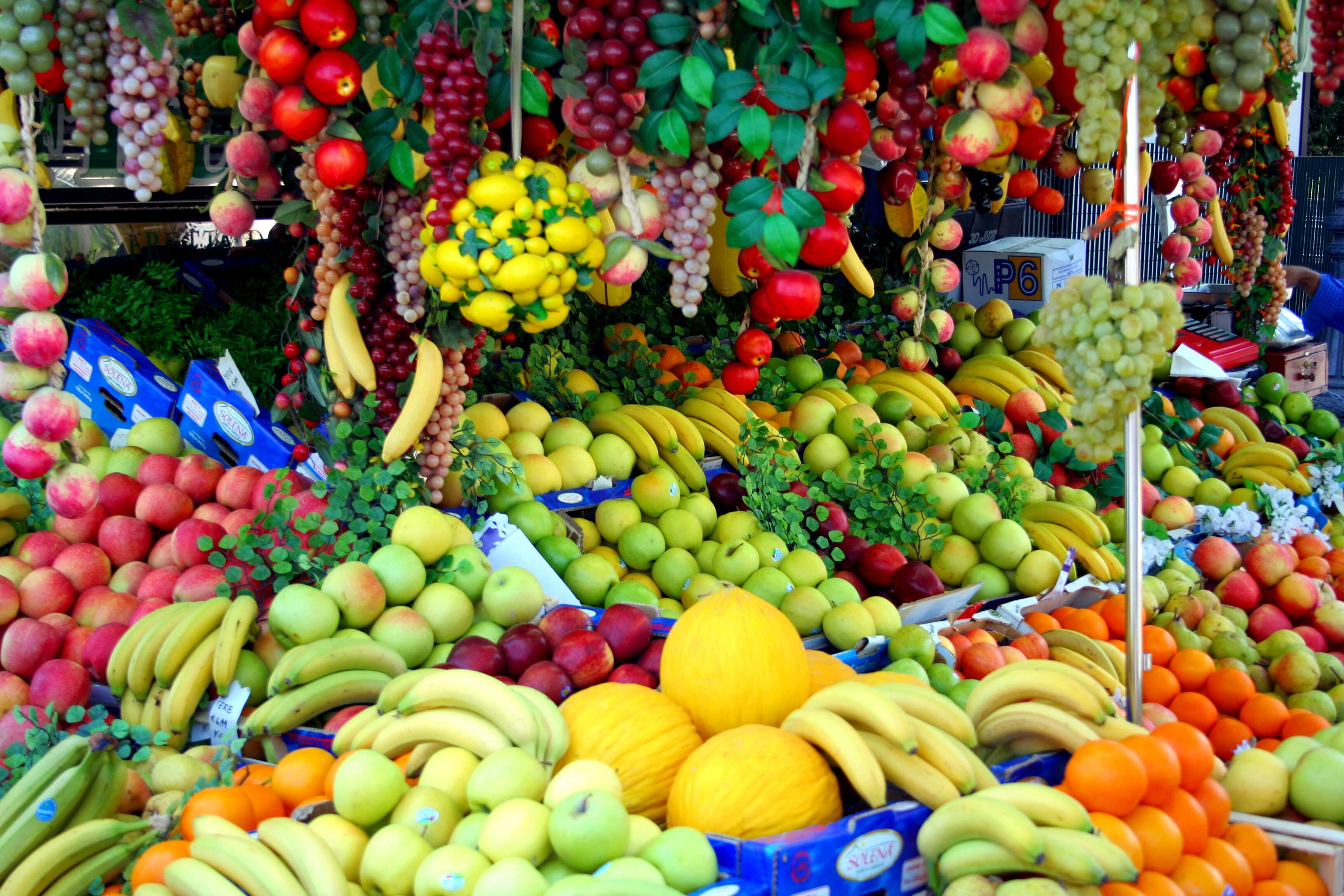
A new study provides valuable insights into pollen abundance and diversity available to honeybee colonies employed in five major pollinator-dependent crops in Oregon and California, including California's massive almond industry.
Saturday, 21 September 2019
Synthesis of UV absorbers from cashew nut shell liquid
 Researchers at Johannes Gutenberg University Mainz (JGU) in Germany, in collaboration with colleagues from the University of the Witwatersrand in Johannesburg in South Africa and the University of Dar-es-Salaam in Tanzania, succeeded in using cashew nut shell liquid (CNSL) as a substitute for petroleum in organic synthesis. Their aim was the development of a sustainable synthesis of soluble organic UV filters.
Researchers at Johannes Gutenberg University Mainz (JGU) in Germany, in collaboration with colleagues from the University of the Witwatersrand in Johannesburg in South Africa and the University of Dar-es-Salaam in Tanzania, succeeded in using cashew nut shell liquid (CNSL) as a substitute for petroleum in organic synthesis. Their aim was the development of a sustainable synthesis of soluble organic UV filters.Friday, 20 September 2019
Scent brings all the songbirds to the yard
*Odor might play a role in mate selection among naturally hybridizing songbirds

Chickadees can smell! That is the news from a study out of Lehigh University, the first to document naturally hybridizing songbirds' preference for the scent of their own species.
Thursday, 19 September 2019
Discovery of a bottleneck relief in photosynthesis may have a major impact on food crops
 Scientists have found how to relieve a bottleneck in the process by which plants transform sunlight into food, which may lead to an increase in crop production. They discovered that producing more of a protein that controls the rate in which electrons flow during photosynthesis, accelerates the whole process.
Scientists have found how to relieve a bottleneck in the process by which plants transform sunlight into food, which may lead to an increase in crop production. They discovered that producing more of a protein that controls the rate in which electrons flow during photosynthesis, accelerates the whole process.Wednesday, 18 September 2019
Wild ground-nesting bees might be exposed to lethal levels of neonics in soil
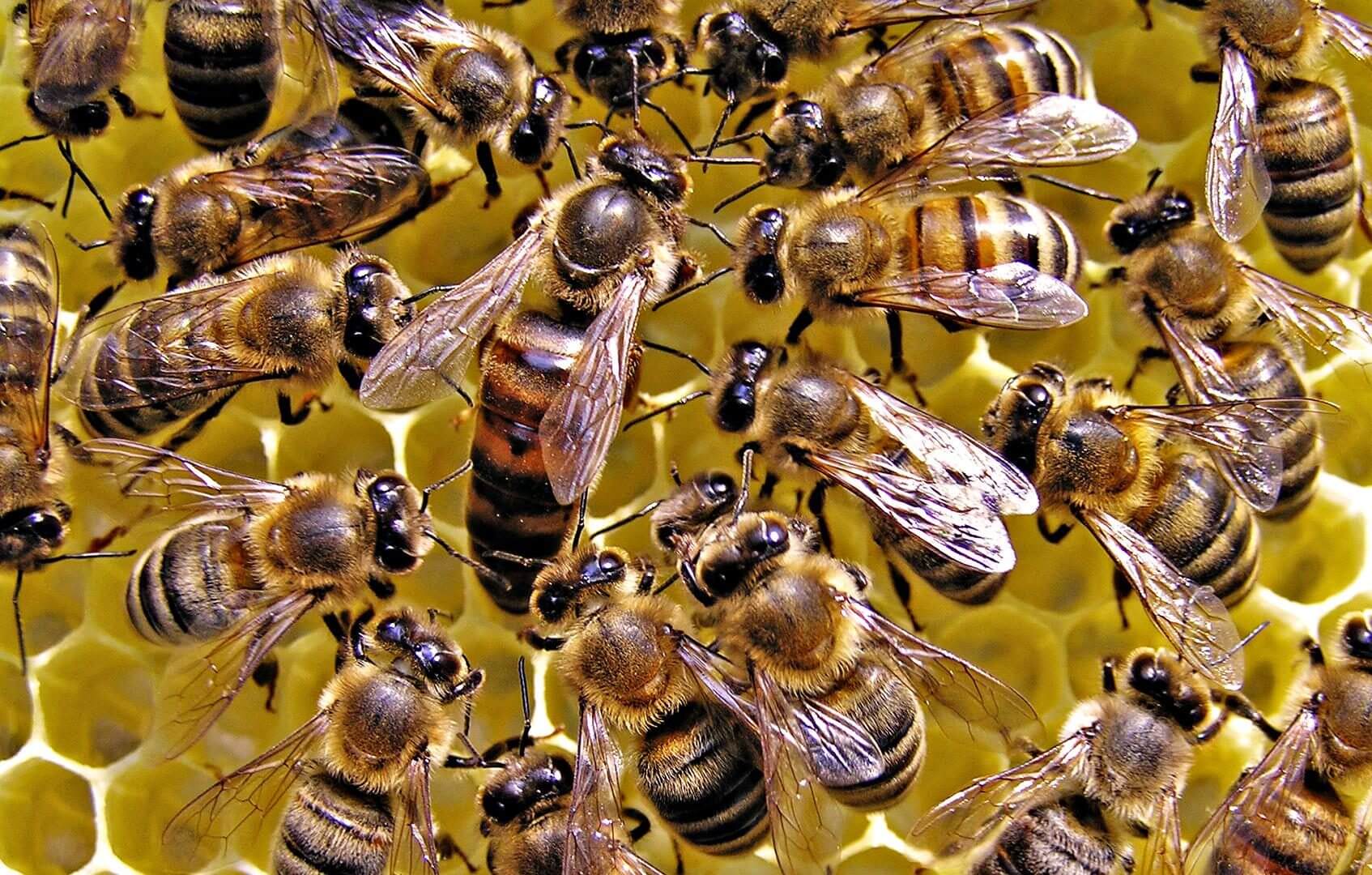 In a first-ever study investigating the risk of neonicotinoid insecticides to ground-nesting bees, University of Guelph researchers have discovered at least one species is being exposed to lethal levels of the chemicals in the soil.
In a first-ever study investigating the risk of neonicotinoid insecticides to ground-nesting bees, University of Guelph researchers have discovered at least one species is being exposed to lethal levels of the chemicals in the soil.Tuesday, 17 September 2019
Suggested move to plant-based diets risks worsening brain health nutrient deficiency
 The momentum behind a move to plant-based and vegan diets for the good of the planet is commendable, but risks worsening an already low intake of an essential nutrient involved in brain health, warns a nutritionist in the online journal BMJ Nutrition, Prevention & Health.
The momentum behind a move to plant-based and vegan diets for the good of the planet is commendable, but risks worsening an already low intake of an essential nutrient involved in brain health, warns a nutritionist in the online journal BMJ Nutrition, Prevention & Health.Monday, 16 September 2019
Lifezgreen unveils e-commerce for agribusiness

In an effort to deepen the development of agricultural
business through efficient innovation to enhancing food distribution across the
nation and entire globe, the Lifezgreen Diamond Acres Limited has officially
launched an e-commerce technology that will fast track means of food
accessibility from the point of production to the market.
NAERLS, Farmers hail FAO 40 years existence
As Food and
Agricultural Organization (FAO) celebrates forty years anniversary in Nigeria,
the Executive Director, National Agricultural Extension Research Liaison Office
(NAERLS), Prof. Mohammed Uthman together with farmers’ representatives have
commended the international agency for its impact on agriculture through
capacity building of stakeholders towards ensuring food security in the
country.
A Banana-Killing Fungus Has Reached Latin America. Does This Spell the End for Bananas?
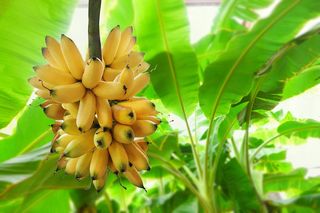 Bad news for banana lovers: A fungus that's particularly adept at killing the fruit has finally reached Latin America — a major supplier of the world's bananas — as scientists long feared it would.
Bad news for banana lovers: A fungus that's particularly adept at killing the fruit has finally reached Latin America — a major supplier of the world's bananas — as scientists long feared it would.Sunday, 15 September 2019
Climate change could shrink oyster habitat in California

Ocean acidification is bad news for shellfish, as it makes it harder for them to form their calcium-based shells. But climate change could also have multiple other impacts that make California bays less hospitable to shelled organisms like oysters, which are a key part of the food web.
Saturday, 14 September 2019
Ancient feces reveal how 'marsh diet' left Bronze Age Fen folk infected with parasites
 New research published today in the journal Parasitology shows how the prehistoric inhabitants of a settlement in the freshwater marshes of eastern England were infected by intestinal worms caught from foraging for food in the lakes and waterways around their homes.
New research published today in the journal Parasitology shows how the prehistoric inhabitants of a settlement in the freshwater marshes of eastern England were infected by intestinal worms caught from foraging for food in the lakes and waterways around their homes.Friday, 13 September 2019
Discovery could pave the way for disease-resistant rice crops
 Researchers have uncovered an unusual protein activity in rice that can be exploited to give crops an edge in the evolutionary arms race against rice blast disease, a major threat to rice production around the world.
Researchers have uncovered an unusual protein activity in rice that can be exploited to give crops an edge in the evolutionary arms race against rice blast disease, a major threat to rice production around the world.Thursday, 12 September 2019
Green chemists find a way to turn cashew nut shells into sunscreen

A team of international scientists has found an environmentally friendly way of producing potential sunscreens by using cashew nut shells, a waste material.
Wednesday, 11 September 2019
ICO, others ask for coffee policy
FMITI
promises rebirth
The visiting Executive Director, International Coffee
Organization (ICO), Mr. Jose Sette has joined other stakeholders in Nigeria to
demand for national policy on coffee that will galvanise the neglected crop towards wealth
and more economic empowerment of farmers just as the Federal Ministry of Industry, Trade and
Investment (FMITI) immediately promised to call for a rebirth conference in
order to reposition the crop to more economy viability.
CORAF, NASC others ponder on low quality inputs for farmers

The West and Central
Africa Council for Agriculture Research and Development (CORAF), National
Agricultural Seeds Council (NASC) and relevant stakeholders in the agricultural
sector have expressed deep concern on how to step up the quality of inputs
being given to farmers at accessesable and affordable prices saying this was
the only way to avert imminent food shortage in view of the geometric
population growth in the West African region.
Compost key to sequestering carbon in the soil
 By moving beyond the surface level and literally digging deep, scientists at the University of California, Davis, found that compost is a key to storing carbon in semi-arid cropland soils, a strategy for offsetting CO2 emissions.
By moving beyond the surface level and literally digging deep, scientists at the University of California, Davis, found that compost is a key to storing carbon in semi-arid cropland soils, a strategy for offsetting CO2 emissions.Tuesday, 10 September 2019
Asian longhorned beetle larvae eat plant tissues that their parents cannot
 Despite the buzz in recent years about other invasive insects that pose an even larger threat to agriculture and trees -- such as the spotted lanternfly, the stink bug and the emerald ash borer -- Penn State researchers have continued to study another damaging pest, the Asian longhorned beetle.
Despite the buzz in recent years about other invasive insects that pose an even larger threat to agriculture and trees -- such as the spotted lanternfly, the stink bug and the emerald ash borer -- Penn State researchers have continued to study another damaging pest, the Asian longhorned beetle.images speak @ the National workshop for analyzing Agri-input supply chains in West Africa and Sahel sub-region
Monday, 9 September 2019
Artificial intelligence helps banana growers protect the world's most favorite fruit
 Artificial intelligence-powered tools are rapidly becoming more accessible, including for people in the more remote corners of the globe.
Artificial intelligence-powered tools are rapidly becoming more accessible, including for people in the more remote corners of the globe.Sunday, 8 September 2019
Where are the bees? Tracking down which flowers they pollinate
Saturday, 7 September 2019
Scientist accuses non-scientists of antagonism to GMOs products
A scientist and director of planning at Agricultural
Research Council of Nigeria (ARCN), Mr. Yarama Ndirpaya has accused non
scientists of being the major antagonists of Genetically Modified Organism
(GMOs) in Nigeria and advised that agricultural research institutes must
integrate biotechnology mechanism into enhancing agricultural modification
towards food security.
AfCFTA: stakeholders want policies for agric produce reinforced
Ask research to generate more technologies
against dumping
Stakeholders have advised
government to as a matter of urgency quickly reposition its agricultural policies so as to be able to properly harness the
economic potentials in the new African Continental-free Trade Areas (AfCFTA) pact
that President Mohammadu Buhari signed recently.
Eating more plant-based foods may be linked to better heart health
 Eating mostly plant-based foods and fewer animal-based foods may be linked to better heart health and a lower risk of dying from a heart attack, stroke or other cardiovascular disease according to new research published in the Journal of the American Heart Association, the Open Access Journal of the American Heart Association/American Stroke Association.
Eating mostly plant-based foods and fewer animal-based foods may be linked to better heart health and a lower risk of dying from a heart attack, stroke or other cardiovascular disease according to new research published in the Journal of the American Heart Association, the Open Access Journal of the American Heart Association/American Stroke Association.Friday, 6 September 2019
Discovery of a bottleneck relief in photosynthesis may have a major impact on food crops
Thursday, 5 September 2019
National livestock movement bans may prove economically damaging
U.S. CORN, SOYBEAN CROPS ARE STILL GOING BACKWARD, USDA SAYS
 More than half of U.S. farm operators say they do business over the internet, a 13-point increase in six years, as ownership of computers and access to the internet blossomed, according to USDA.
More than half of U.S. farm operators say they do business over the internet, a 13-point increase in six years, as ownership of computers and access to the internet blossomed, according to USDA. Wednesday, 4 September 2019
Interview- CBN is passionate to develop oil palm plantation through stakeholders- Engr Adeyinka
Let meet you sir?
My name is Engr. Samuel Ajayi Adeyinka. I am the chairman
Oil-palm Grower Association of Nigeria farmers in Ogun state.
New GMO Controversy: Are the Herbicides Dangerous?
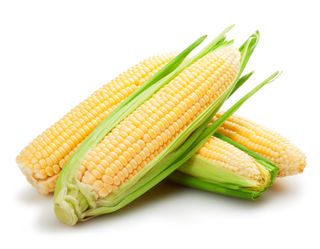 Although genetically modified organisms (GMOs) don't appear by themselves to have ill effects on human health, the herbicides used on these crops could be an overlooked health threat, some researchers say in a controversial new opinion piece.
Although genetically modified organisms (GMOs) don't appear by themselves to have ill effects on human health, the herbicides used on these crops could be an overlooked health threat, some researchers say in a controversial new opinion piece.Tuesday, 3 September 2019
New Farm Maps Offer In-Depth Picture of Global Agriculture
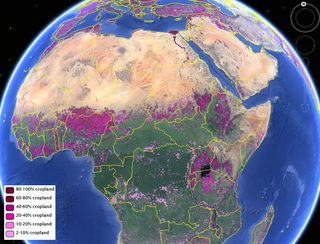 All farmers on the ground know their land as well as their own wrinkled hands, but totaling up all the world's cropland is a difficult task.
All farmers on the ground know their land as well as their own wrinkled hands, but totaling up all the world's cropland is a difficult task.Message to the new Ministers of Agriculture

A visit to all research Institutes will properly give an insight to why we are food deficient. The Moorplantation Cereal Research Institute at Ibadan that house many Federal government projects is
Research environment turned party ground

It is Friday party time right inside a venue that is called Agricultural research Institute managed by Nigeria Cereal Research Institute ( NCRI).
NAIC cautions farmers against flood alert

The Managing Director (MD)/Chief Executive Officer (CEO),
Nigerian Agricultural Corporation (NAIC) Mrs. Folashade Joseph has warned all
farmers to take very serious the red alert on flood as issued by the Federal Government in about 15 states
of the federation.
Monday, 2 September 2019
Images speak @ the 6th APRNet/ IFPRI/USAID/MSU Multistakeholders forum themed ' Towards a sustainable Agricultural led for Growth Economic Growth and Recovery in Nigeria' @ Abuja
Engineering a Better Food Bank
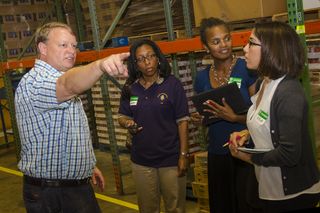 For the past few years, a team of engineers has spent long hours poring over data files and complex computer models.
For the past few years, a team of engineers has spent long hours poring over data files and complex computer models. We’ll strengthen research institutes for better seeds says Sabo Nanono

The Minister
of Agriculture and Rural Development, Alhaji Sabo Nanono, has said that the
ministry under his stewardship would ensure that agricultural research
institutes are strengthened to promote improved seedlings and seeds that will
galvanise food production in the country.
Seed companies in trouble as low incentive, insecurity demoralize farming
There are indications that the seed companies are facing
hard times on the sales of their certified seeds to farmers, reason being low
inputs incentive from government coupled with insecurity situation in the
country that had made many to leave farming activities for fear of being
kidnapped or killed by armed bandits.
Sunday, 1 September 2019
FG releases new improved wheat variety for demand quality
The Federal Government (FG) National Crop Varieties and
Livestock Breeds Committee domiciled at the National Centre for Genetic
Resources and Biotechnology (NACGRAB) has just released and registered a new
improved wheat variety (LACRI WHIT-11) (IMAM (ATTILA 7). The official release of
the seed took place in Ibadan, recently.
Institute’s new boss determined to attract grants for research
The new Executive Director for Institute for Agricultural
Research and Training (IAR&T) Moor Plantation, Ibadan, Prof. Veronica Obatolu
has promised to supplement the epileptic research funding in the system by
attracting more grants and donors through an established office for the
purpose.
How Despots Arose With Agriculture (Op-Ed)
 For hundreds of thousands of years humans lived in hunter-gatherer societies, eating wild plants and animals. Inequality in these groups is thought to have been very low, with evidence suggesting food and other resources were shared equally between all individuals.
For hundreds of thousands of years humans lived in hunter-gatherer societies, eating wild plants and animals. Inequality in these groups is thought to have been very low, with evidence suggesting food and other resources were shared equally between all individuals.
Subscribe to:
Comments (Atom)














